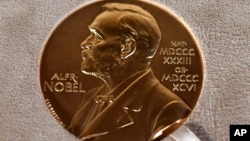On February 8, Russia’s science and higher education minister, Valery Falkov, congratulating scientists on the Day of Russian Science, referred to Russian scientists Ivan Sechenov and Alexander Butlerov, as well as the Soviet scientist Leonid Kantorovich, as “Nobel laureates”:
"The pride of Russia is our Nobel laureates - Sechenov, Butlerov, Kantorovich, and many others."
That is partly false.
Ivan Sechenov wasn’t a Nobel Prize laureate. Alexander Butlerov died five years before the first Nobel Prize was awarded. Leonid Kantorovich received the Sveriges Riksbank Prize in Economic Sciences in Memory of Alfred Nobel. Whether that prize should be considered a “true Nobel” is a matter of some controversy.
Sechenov, a Russian psychologist, physiologist and medical scientist, was born in 1829 and died in 1905.
He is not among the 965 individuals listed on the Nobel Prize website as having received the honor since it was first awarded in 1901.
In listing Sechenov’s main awards, TASS, Russia’s largest state-owned news agency, does not include the Nobel:
“Knight of the Order of St. Stanislaus 1st class, St. Vladimir Equal to the Apostles 3rd class, St. Anna 3rd class. For a course of lectures ‘On Animal Electricity,’ he was awarded the Demidov Prize (1863).”
According to Encyclopedia Britannica, Russian chemist Aleksandr Butlerov “helped advance the theory of structure in chemistry.” He was born in 1828 and died in 1886, five years before the first Nobel Prizes were awarded in 1901.
According to the Nobel Prize website, a deceased person cannot be nominated for the award:
“[A] Nobel Prize cannot be awarded posthumously. However, since 1974, if the recipient dies after the prize has been announced they can still be awarded it.”
Leonid Kantorovich (1912-1986) was a Soviet mathematician and economist who helped create linear programming.
In 1975, Kantorovich and Tjalling Koopmans, a Dutch-American mathematician and economist, were awarded the Sveriges Riksbank Prize in Economic Sciences in Memory of Alfred Nobel “for their contributions to the theory of the optimum allocation of resources.”
The Sveriges Riksbank Prize in Economic Sciences in Memory of Alfred Nobel is often informally called the Nobel Prize in Economics. This prize was established by the Sveriges Riksbank, Sweden’s central bank, in 1968, in memory of Alfred Nobel, founder of the Nobel Prize. It has been awarded for achievements in the field of economic sciences since 1969.
The Nobel Prize site says that “[T[he prize in economic sciences is awarded by the Royal Swedish Academy of Sciences, Stockholm, Sweden, according to the same principles as for the Nobel Prizes that have been awarded since 1901.”
Among the recipients of the Sveriges Riksbank Prize in Economic Sciences in Memory of Alfred Nobel are Ben Bernanke (2022), the former chair of the Federal Reserve, the U.S. central bank; Paul Krugman (2008), an American economist who is the Distinguished Professor of Economics at the Graduate Center of the City University of New York and a columnist for The New York Times; Milton Friedman (1976), the American economist widely regarded as the founder of monetarism; and Friedrich von Hayek (1974), the Austrian economist noted, as Encyclopedia Britannica put it, "for his criticisms of the Keynesian welfare state and of totalitarian socialism."
Nevertheless, the Sveriges Riksbank prize is the subject of controversy since, unlike the Nobel Prizes for physics, chemistry, physiology or medicine, literature, and peace, it was not established by Alfred Nobel in his last will and testament in 1895.
Four members of Alfred Nobel’s family formally distanced themselves from the Swedish central bank-sponsored award. Peter Nobel, the great-grandnephew of the founder and a Swedish human rights lawyer, called the Prize in Economic Sciences "a PR coup by economists to improve their reputation ... most often awarded to stock market speculators.”
It should be noted that Nobel Prize founder Alfred Nobel was a Swedish chemist best known for inventing dynamite and other explosives.





